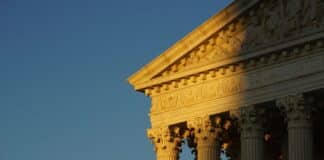Similar controversy at Emory Law School apparently resolved when student government finally agrees to recognize free speech group.
Yale Law School is under fire from two U.S. senators, five governors, eight House members and two dozen attorneys general — all Republicans — for its refusal to punish students who disrupted a March 10 free speech event sponsored by the Federalist Society.
“The students engaged in physical intimidation and menacing behavior that has no place anywhere,” they wrote to recently reappointed Dean Heather Gerken. “Yale knows perfectly well” from video and audio evidence that the Alliance Defending Freedom (ADF) and American Humanist Association lawyers, and Yale Law Professor Kate Stith, could not “speak freely.”
The April 7 letter was coordinated by the Philadelphia Statement, an academic-led initiative to combat cancel culture that launched with its eponymous declaration in August 2020.
The first signatures are Sens. Ted Cruz of Texas and Mike Lee of Utah. The other 1,400 are dominated by academic and advocacy affiliations.
Other signers include former Secretary of Housing and Urban Development Ben Carson, human rights activist Ayaan Hirsi Ali, clinical psychologist Jordan Peterson, Princeton University Professor Robert George and former President Trump’s lawyer John Eastman, a recurring cancelation victim. About 30 listed law school affiliations, but only two alumni from Yale Law.
A spokesperson for the Philadelphia Statement told Just the News that its original signatories, who include Ali, George and Eastman, “worked together to draft and finalize the letter” and then gather signatures.
The letter demands Gerken condemn the students’ disruptive behavior, enforce campus free speech policies against them and “[c]ommit to ensuring that speakers with diverse views are welcome at Yale.”
The dean must also disavow Yale Law’s initial statements that “grossly downplayed the chaos they wrought,” which eventually prompted a police response and evacuation of the speakers. The letter accused administrators of falsely stating “a police presence was not needed” so as to appease the vast majority of the student population who claimed the protest was “peaceful.”
“Our nation desperately needs the next generation of attorneys, legislators, judges, and Supreme Court justices” — four of the current nine having graduated from Yale Law — “to be marked by the character and values that undergird the American legal profession and a free society,” the letter says.
Signatories also implied Yale Law must rebuke and warn its students about the Southern Poverty Law Center (SPLC), whose “discredited” characterization of ADF as a “hate group” was allegedly invoked by some student protesters.
SPLC designations previously played a role in a student riot against a 2017 event at Middlebury College and a gay activist’s foiled mass shooting at the Family Research Council 10 years ago, the letter says.
Yale Law students “could derail their promising careers if they are motivated by SPLC propaganda to engage in acts of disruption, intimidation, and worse,” the signatories wrote. They noted at least two federal judges asked colleagues not to hire disruptive student protesters for clerkships.
The Philadelphia Statement spokesperson said it didn’t know of other disruptions or acts of violence that cited SPLC ratings other than the three in its letter. Neither Yale Law nor SPLC responded to queries.
Sen. Cruz will get to test Yale’s response to the letter when he appears on campus April 11 for a live taping of his video podcast Verdict, hosted by the 11-year-old William F. Buckley, Jr. Program, which promotes intellectual diversity at Yale.
The five governors on the letter are Tennessee’s Bill Lee, Iowa’s Kim Reynolds, Oklahoma’s Kevin Stitt, Nebraska’s Pete Ricketts and Mississippi’s Tate Reeves. The only missing Republican AGs are New Hampshire’s John Formella, North Dakota’s Drew Wrigley and Wyoming’s Bridget Hill.
Days earlier, another private law school controversy was apparently resolved.
The Student Bar Association (SBA) at Atlanta’s Emory Law School unexpectedly granted a charter to the Emory Free Speech Forum (EFSF) after rejecting its application due to the “real harm” that debate could cause and the possibility that the club might question critical race theory or invite conservative author Heather Mac Donald to speak.
The Foundation for Individual Rights in Education and Foundation Against Intolerance and Racism, which sent the SBA legal warnings, told Just the News they didn’t know what prompted the reversal. SBA President Jadyn Taylor, EFSF and Emory Law did not respond to queries.
The Georgia Legislature sent a bill to GOP Gov. Brian Kemp April 4 to eradicate so-called free speech zones from public campuses, though it doesn’t cover private schools like Emory. Democrats claimed it could inhibit counterprotests.
EFSF has already used its charter, which comes with free campus event space, to host former ACLU President Nadine Strossen, a staunch civil libertarian, in person.
ACLU staff have not been exempt from disruptive campus protests. Black Lives Matter activists successfully shut down an event with the Virginia affiliate’s leader at the College of William and Mary in 2017, chanting “Liberalism is white supremacy.” Weeks later, the Virginia affiliate scrubbed its website of its criticism of heckler’s vetoes.
Reporting by Just The News.






